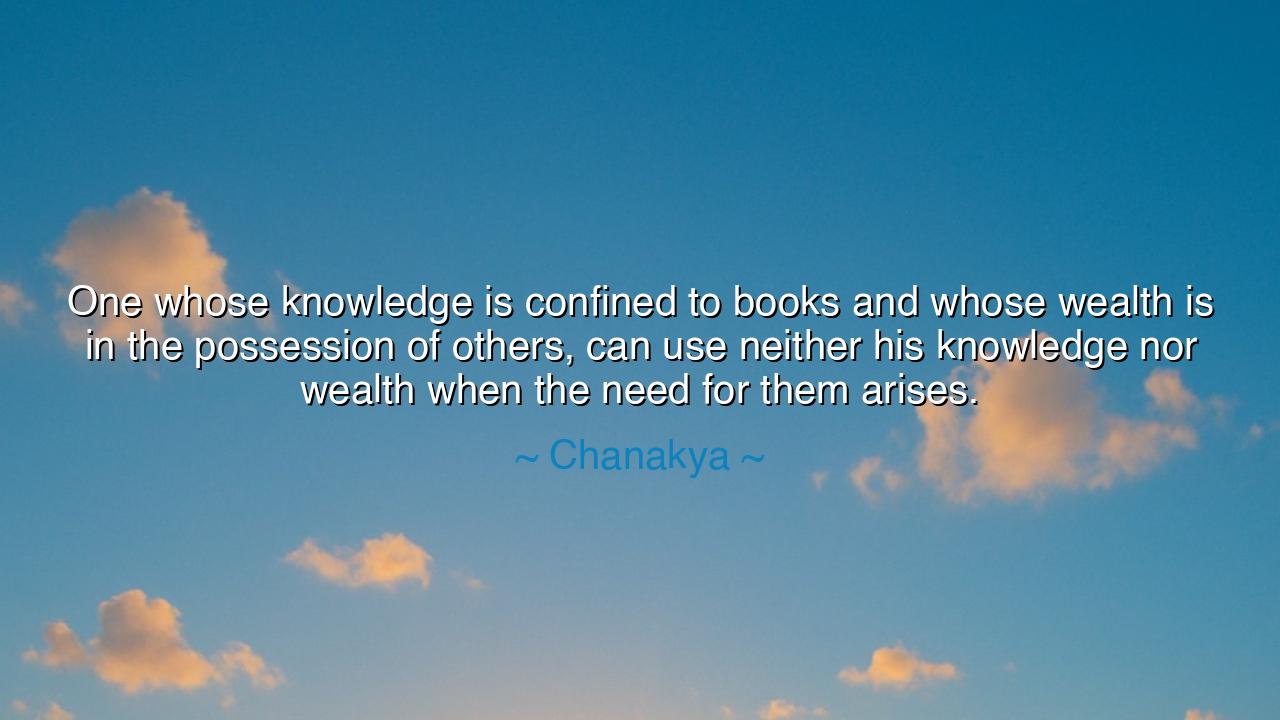
One whose knowledge is confined to books and whose wealth is in
One whose knowledge is confined to books and whose wealth is in the possession of others, can use neither his knowledge nor wealth when the need for them arises.






Hear the keen words of Chanakya, the ancient sage, teacher, and statesman of India: “One whose knowledge is confined to books and whose wealth is in the possession of others, can use neither his knowledge nor wealth when the need for them arises.” In this truth, he strikes at the heart of human folly: that treasures, however great, are worthless if they cannot be wielded in the hour of necessity. Knowledge unused is like a sword left to rust in its sheath, and wealth beyond reach is like food locked away while hunger gnaws the belly.
Chanakya was no idle dreamer; he was a man who shaped empires. Known also as Kautilya, he authored the Arthashastra, a treatise of governance, economy, and war. He understood from experience that wisdom is of no power unless it is lived and applied, and that riches hoarded beyond one’s grasp are of no service in crisis. For in the courts of kings, in the struggles of nations, in the lives of ordinary men, only what is ready at hand—practical knowledge and accessible wealth—can protect and empower.
Consider the student who memorizes scrolls but never practices. When the time comes to heal, he cannot save a life; when the time comes to lead, he cannot command; when the time comes to act, his words dissolve like mist. His knowledge is confined to books, never tested in the fires of real life, and thus it fails him. By contrast, the physician who has studied and practiced, whose hands have learned the craft as much as his mind, is ready when the sick call. It is not possession of knowledge, but the living use of it, that makes one strong.
History also gives us examples in wealth. Think of the nobles of France before the Revolution. They had titles, lands, and treasures beyond measure, yet when famine struck, their riches were tied up in privilege and inaccessible to the people. The hungry stormed their palaces, and their wealth could not shield them from the blade of the guillotine. Their riches were as useless as empty air. Compare this with the merchants of Florence, who invested their wealth in trade, in art, in the needs of their city; their names—Medici—are remembered with honor, for their wealth was living, flowing, and ready when needed.
Chanakya’s teaching also warns us against complacency. Many believe that to possess books is to possess wisdom, and to possess wealth in name is to be secure. But possession is not power unless it is within reach. A library unread is no more useful than an empty shelf. A treasury controlled by another is no more protective than sand. Both must be internalized, both must be made active—knowledge must become practice, and wealth must become resource—otherwise, they vanish like shadows when the sun of necessity rises.
The lesson, then, is plain: make your knowledge living, and your wealth usable. Do not confine your learning to the page—test it, practice it, embody it, until it becomes a strength you can call upon in any trial. Do not let your riches be bound in the hands of others—manage, guard, and apply them so that they are ready when need calls. For life is uncertain, and the hour of crisis comes without warning; only what you have made truly your own can stand with you when it arrives.
What then must you do? Read, but also act. Learn, but also practice. Guard your wealth, but also put it to work for good. Let your knowledge be stored not only in books, but in your heart and hands. Let your wealth be not a distant dream, but a tool you can use to protect, to serve, to create. In this way, you will walk in true preparedness, and neither ignorance nor poverty will surprise you when the storm breaks.
Thus remember Chanakya’s words: “One whose knowledge is confined to books and whose wealth is in the possession of others, can use neither his knowledge nor wealth when the need for them arises.” Let this truth be a lantern to your path. For wisdom and riches are not in their possession, but in their use. And the one who holds them rightly will stand unshaken when the trials of life descend.






AAdministratorAdministrator
Welcome, honored guests. Please leave a comment, we will respond soon